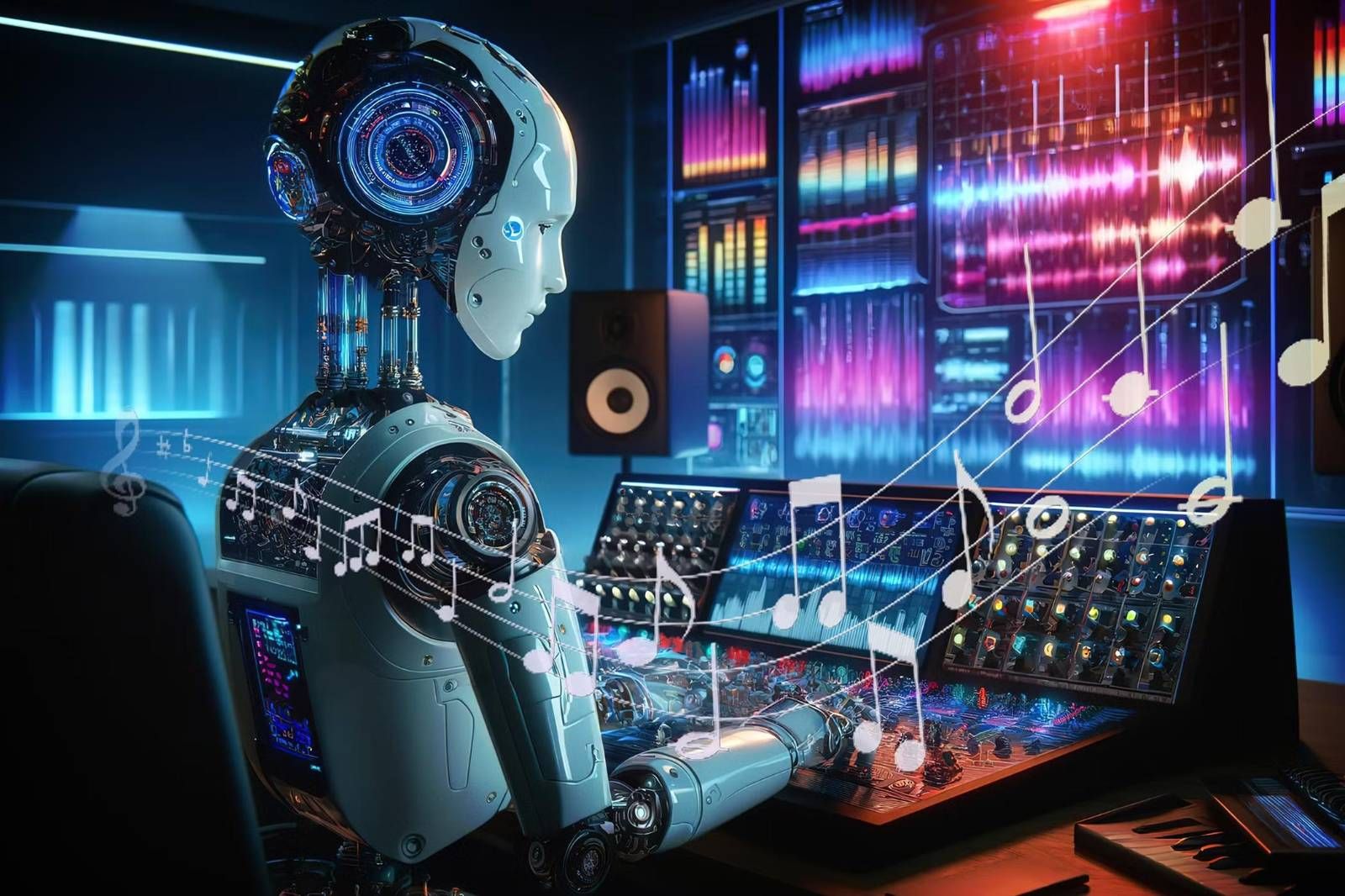

In the realm of music creation, artificial intelligence has emerged as a powerful ally for songwriters and composers. Let’s learn more about this topic below with Bottle Flip, exploring how AI tools are revolutionizing the process of crafting song lyrics and melodies.
The intersection of artificial intelligence and music composition has been a topic of fascination for both technology enthusiasts and musicians alike. As AI continues to advance, its applications in the creative arts have become increasingly sophisticated and widespread. In the realm of songwriting, AI tools have emerged as powerful assistants, capable of generating lyrics, suggesting melodies, and even composing entire songs.
One of the most intriguing aspects of AI in music creation is its ability to analyze vast amounts of existing music and lyrics, learning patterns, structures, and styles. This knowledge is then applied to generate new and original content. For students and creators alike, these AI tools offer a unique opportunity to explore new creative avenues and overcome writer’s block.
The concept of AI-assisted songwriting might seem counterintuitive to some, as music has long been considered a deeply human form of expression. However, many artists and songwriters are finding that AI tools can serve as a source of inspiration, a collaborative partner, and a means to push the boundaries of their creativity. Bottle Flip, as an AI tool for song lyrics creation, exemplifies this trend, offering users a unique blend of machine learning and musical intuition.
At its core, AI-powered lyric generation relies on complex algorithms and machine learning models trained on extensive datasets of existing songs. These models analyze patterns in vocabulary, rhyme schemes, metaphors, and thematic elements to generate new lyrical content that adheres to established songwriting conventions while still maintaining a degree of originality.
The process typically begins with the user providing some initial input, such as a theme, a few lines of lyrics, or even just a single word. The AI then uses this input as a starting point to generate complementary lyrics. The level of user involvement can vary depending on the specific tool and the user’s preferences. Some creators might use AI-generated lyrics as a foundation to build upon, while others might use them as a source of inspiration to spark their own ideas.
Bottle Flip, as an AI lyric generation tool, employs advanced natural language processing techniques to create cohesive and meaningful lyrics. It takes into account factors such as the emotional tone of the input, the desired genre, and even the intended audience. This level of customization allows users to tailor the output to their specific needs and artistic vision.
The integration of AI into the songwriting process offers numerous benefits for both aspiring and experienced musicians. One of the most significant advantages is the ability to overcome creative blocks. When faced with writer’s block, songwriters can turn to AI tools like Bottle Flip to generate new ideas or explore different lyrical directions they might not have considered otherwise.
Moreover, AI-assisted songwriting can significantly speed up the creative process. By quickly generating multiple lyrical options, these tools allow songwriters to focus more on refining and personalizing the content rather than starting from scratch. This efficiency can be particularly beneficial for professionals working under tight deadlines or students juggling multiple projects.
Another advantage of AI in songwriting is its potential to inspire unique and unexpected combinations of words and phrases. The vast knowledge base that AI models draw from can lead to novel metaphors, unconventional rhyme schemes, and fresh perspectives on familiar themes. This can help songwriters break out of their usual patterns and explore new creative territories.
For students and novice songwriters, AI tools can serve as valuable learning aids. By analyzing the structure and content of AI-generated lyrics, users can gain insights into effective songwriting techniques, rhyme patterns, and thematic development. This educational aspect makes tools like Bottle Flip not just creative assistants but also powerful learning resources.
While the benefits of AI in songwriting are numerous, it’s important to acknowledge the challenges and considerations that come with this technology. One of the primary concerns is the question of originality and authenticity. Critics argue that AI-generated lyrics may lack the depth of emotion and personal experience that human-written lyrics often convey.
However, proponents of AI in songwriting emphasize that these tools are meant to augment human creativity, not replace it. The most effective use of AI in music creation involves a collaborative approach, where the AI-generated content serves as a starting point or inspiration for further human refinement and personalization.
Another consideration is the potential for AI to homogenize musical styles. If many songwriters rely heavily on the same AI tools, there’s a risk of creating a more uniform sound across the industry. To counter this, it’s crucial for artists to use AI as one tool among many in their creative arsenal, maintaining their unique voice and vision.
The use of AI in songwriting also raises important ethical and legal questions. Issues of copyright and ownership become more complex when AI is involved in the creative process. Who owns the rights to a song that was partially or wholly generated by an AI? How do we attribute authorship in these cases?
These questions are still being debated in legal and artistic circles, and as AI technology continues to evolve, new frameworks may need to be developed to address these issues. For now, most AI songwriting tools, including Bottle Flip, operate under the assumption that the user retains full rights to the content they create using the tool.
Despite the advanced capabilities of AI in lyric generation, the human element remains crucial in the songwriting process. Emotion, personal experience, and the subtle nuances of human expression are aspects that AI cannot fully replicate. The most successful use of AI in songwriting involves a balance between machine-generated content and human creativity.
Many songwriters find that using AI tools like Bottle Flip enhances their creative process rather than diminishing it. By providing a starting point or offering alternative perspectives, AI can help writers overcome creative blocks and explore new directions. The human songwriter then takes these AI-generated ideas and refines them, infusing them with personal meaning and emotional depth.
This collaborative approach between human and machine often leads to songs that are both innovative and emotionally resonant. The AI provides the raw material, while the human artist shapes it into a finished product that reflects their unique voice and vision.
As AI technology continues to advance, we can expect to see even more sophisticated tools for music creation. Future developments may include AI that can generate not just lyrics but complete musical compositions, including melodies, harmonies, and even full orchestrations.
We may also see more personalized AI tools that can learn and adapt to an individual artist’s style over time. These tools could potentially offer suggestions that are increasingly tailored to the user’s preferences and artistic sensibilities.
Another exciting prospect is the integration of AI with other music technologies, such as virtual instruments and digital audio workstations. This could lead to comprehensive music creation suites where AI assists at every stage of the process, from initial ideation to final production.
However, as these technologies evolve, it will be crucial to maintain a balance between technological innovation and human creativity. The goal should be to use AI as a tool to enhance and expand human creative capabilities, rather than to replace the unique perspective and emotional depth that human artists bring to their work.
Beyond its applications in professional songwriting, AI tools like Bottle Flip have significant potential in music education. For students learning the craft of songwriting, these tools can provide valuable insights into lyrical structure, rhyme schemes, and thematic development.
AI-powered analysis of existing songs could help students understand the elements that make certain lyrics effective or memorable. By studying the patterns and techniques used in successful songs, aspiring songwriters can develop their skills more rapidly.
Furthermore, AI tools could be used to create personalized learning experiences for music students. By analyzing a student’s work and progress, AI could offer tailored suggestions and exercises to help them improve specific aspects of their songwriting.
The accessibility of AI songwriting tools has the potential to democratize music creation on a global scale. Artists from diverse backgrounds and cultures can now access sophisticated songwriting assistance, potentially leading to a more varied and inclusive music landscape.
This global accessibility could also facilitate cross-cultural collaborations and exchanges. AI tools could potentially bridge language barriers, allowing artists to collaborate across linguistic divides and create music that resonates with a wider, more diverse audience.
In conclusion, AI tools for song lyrics creation, exemplified by innovations like Bottle Flip, represent a fascinating convergence of technology and artistry. While these tools offer exciting possibilities for both established and aspiring songwriters, they are best viewed as complementary to human creativity rather than a replacement for it.
As we move forward, the key will be to harness the power of AI in ways that enhance and expand human creative capabilities. By striking the right balance between technological innovation and artistic intuition, we can create a future where AI and human creativity work in harmony to produce music that is both innovative and deeply meaningful.